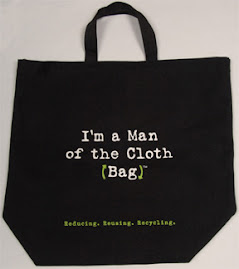When Mark and I put our home on the market a few months ago, we didn’t necessarily expect it to sell. Imagine our surprise when we accepted an offer last week. One of the few contingencies of the sale is that we move out by October 8th—yikes!
Obviously, Mark and I are very green. Mark drives a hybrid 3 miles to work and I work from home. We take short showers (and use a low-flow showerhead). We recycle. We compost. We use cloth bags and buy local. But, even for us, a green move is a challenge.
We found a new home we love (cross your fingers our offer is accepted) that’s significantly smaller than our current home. That means we’re not just faced with packing and moving, but we’re faced with getting rid of a lot of stuff. As we’re sorting our possessions, we place things in four main piles: (1) keep, (2) give to family/friends, (3) donate, and (4) recycle. Unfortunately, we needed to create a fifth pile: trash.
There are some things that simply don’t fit in any of our four main piles. Luckily, our trash pile is very, very small, but every time I add something to it, I feel a pang of green guilt. Why I bring this up is that if very green people still end up with stuff in a “trash” pile, I shutter to think about what happens when non-eco people move.
Question of the blog: What are your tips for ensuring an authentically green move?
Wednesday, September 24, 2008
Is a Green Move Possible?
Monday, September 15, 2008
Wanna Know the Not-So-Sweet Surprise?
Have you seen the ads promoting—of all things—high fructose corn syrup? At first, I found it intensely amusing that the makers of this prolific "poison" have the need to defend their product as a sweet surprise. And then I got upset.
In the commercials I’ve seen, the actors who question the use of high fructose corn syrup (HFCS) are portrayed as denser than all those arteries clogged by years of eating processed “foods” high in HFCS. When asked why HFCS is bad, these paid actors couldn't come up with one single reason. Well, here are just three I can quickly come up with:
1. Obesity and Type-2 Diabetes (just a few of the reasons current generations aren’t expected to live as long as their parents)
2. Focus on Quantity Not Quality (“foods” high in HFCS—and there are many, from soda to crackers—are cheap because this main ingredient has no nutritional value)
3. Environmental Destruction (corn is not only one of the most genetically modified crops, but it uses something like 162 million pounds of chemical pesticides and produces early 49 billion pounds of greenhouse gasses per year)
Please don’t be brain- and belly-washed! Look at labels and, whenever possible, avoid high fructose corn syrup. HFCS helps processed “foods” have a longer shelf life (as opposed to eating fresh, organic, and local fruits and vegetables which are full of nutrients our bodies crave). I just read that a woman who promotes healthy eating travels the country with a fast food hamburger she bought two years ago . . . as she unwraps it, each audience gasps at the still-very-recognizable bun and burger. Appetizing?
It’s a fact that many overweight and obese people are actually malnourished. To me, the not-so-sweet surprise is that HFCS is partly to blame. When cheap, calorie-rich substitutes routinely pass as food, there’s a problem. Luckily, we have many, many alternatives.
By the way, I wrote to the folks at the Corn Refiners Association but—sweet surprise—they haven’t responded!
Question of the blog: Do you currently check labels for high fructose corn syrup?
Thursday, September 11, 2008
Where Were You Seven Years Ago Today?
I was working at home on the bright blue morning of September 11, 2001. I had just gotten off the phone with Mark when I turned on the television to catch up on the morning's news before starting my day. The first plane had just hit one of the two World Trade Centers and the television anchors were reporting that it was most likely an accident. I stood in front of the television, transfixed; moments later, I saw a streak in the corner of the screen and then the second plane hit . . . and everything changed.
I didn’t know anyone on any of the four planes, or in New York, Pennsylvania, or Washington D.C. but, like all Americans, I grieved and still grieve for the thousands who gave their lives that day and for the many, many loved ones who will forever have a hole in their hearts. They ask that we never forget, and I hope we never do.
Earlier this year, Mark and I traveled to New York City. We walked to the site of the former World Trade Centers and as I looked out and down—knowing I should have been looking out and up—I started to cry. For me, it was the same as my experience at Pearl Harbor: horror and pain mixed with hope and pride.
Barack Obama is calling for a return to the post-9/11 sense of community and participation. I remember those days—when it was comforting to be with others, looking people in the eye, being close, talking, sharing, listening. I liked that America. As a divisive election nears, let’s try to remember that we’re more alike than we are unalike, that our political affiliation, sex, religious belief, cultural background, and even our shade of green doesn't matter as much as the fact that we are all citizens of the world.
Question of the blog: Where were you seven years ago today?
Wednesday, September 10, 2008
What If You Put “Green” Lipstick on a Pig?
Republican Vice Presidential candidate, Sarah Palin, doesn’t think the human race has anything to do with global warming (perhaps she foolishly and dangerously thinks this, like the Iraq War, is “a task that is from God”). For those of us with an open mind and an active brain, the link between humans and the changing planet is not even a question . . . it’s a fact.
It seems that Palin, like John McCain and his mentor, George W. Bush, all read and, worse, believe the same severely edited documents put out by government-paid lawyers (not impartial scientists, mind you!).
I don’t care if you’re stupid, just don’t ruin my planet.
Even if we aren’t to blame for increased CO2 emissions, an uptick in severe storms, and rising sea levels, what’s wrong with encouraging citizens to make positive changes like reducing our dependence on foreign oil?
Until a green-minded President gets into office and (finally) stands up to big business and makes the changes this world desperately needs, it’s up to each of us to make as many changes as possible. I call it leading the leader. And once that green-minded President gets into office, we need to retain our individual responsibility. Going green is for life, both literally and figuratively.
To see just how green you are (or are not), take this “calculate your impact” quiz by MSN.com.
Question of the blog: Will a candidate’s commitment to the environment—or his/her failure to step up to the green plate—influence the way you vote this November?
P.S. Did you know John McCain used the "putting lipstick on a pig" comment when referring to a belief held by Hillary Clinton? Perhaps, at his age, he simply forgot.
Tuesday, September 9, 2008
Is There an End to “Unlimited”?
I saw a television commercial yesterday for a chain restaurant, promoting its offer of unlimited shrimp. What it sees as a great temptation, I see as gluttony and a reflection of just how far we’ve gone down the wrong path.
I’m a firm believer that you get what you pay for. The current economy is bad—I feel it as much as you do—but I’m absolutely unwilling to compromise quality for quantity.
Sure, you can pay $8 and stuff your face with non-organic shrimp bathed in a high-sodium, high-fat glaze—and perhaps a few non-organic, over-cooked veggies thrown in for “good” measure—but what you’re getting in return for your investment are unappetizing side effects like exposure to toxins and pesticides, indigestion, and fatigue.
Think about it this way: Is someone really going to offer an unlimited amount of quality?
A national morning news show recently highlighted a family that feeds itself from a most meager budget each week. The family was celebrated for cutting corners and cutting costs. In my eyes, it was also honored for cutting nutrition. I’d rather hear about a family that cleverly manages to find the most affordable sources for fresh, local, and organic fare . . . where the parents have oodles of energy and no health problems . . . and where the kids have no trouble concentrating in school.
Don’t be fooled by promotional gimmicks and advertising propaganda. You and your family deserve real nutrition—it might not be offered in “unlimited” quantities but, I assure you, the quality is priceless.
Question of the blog: Has the bad economy forced you to sacrifice your eating habits?
Monday, September 8, 2008
Are Pesticides Really Peopleicides?
I don’t remember when I first heard of organic food—certainly, it was many years ago—but the idea instantly resonated with me. Exposing ourselves to harmful chemicals designed to kill isn’t exactly appetizing.
Back then, organic fruits and vegetables weren’t just hard to find, they were expensive. Now, they are in almost every grocery store and often quite affordable (if you’re a bargain shopper like me, you know just where to go to get the best deals; I often pay less for organic food than the conventional counterparts).
So, why go organic?
A. It’s Healthy. By eating organic fruits and vegetables, you’ll limit your exposure to pesticides by as much as 90 percent; these toxins attack your immune, nervous, and reproductive systems and are especially bad for fetuses, young children, and the elderly.
B. It’s Really Healthy. Four years ago, a research associate with the Biochemical Institute at the University of Texas, Austin, published analysis of data collected by the USDA in 1950 and 1999 on the levels of 13 nutrients in more than 40 food crops. The results: after the addition of pesticides and breeding techniques (for oh-so-important criteria like rapid growth and storage life) the protein in the conventional crops declined by six percent; phosphorous, iron, and calcium declined between nine percent and 16 percent; ascorbic acid declined 15 percent; and riboflavin declined 38 percent. In organic crops, those nutrients are still there!
C. It Just Tastes (& Looks) Better. This weekend, Mark and I bought local, organic apples and I wish I could share our bounty with you. The fruit is crisp, sweet, and firm . . . and it isn’t shiny from wax and other add-ons.
So which fruits and vegetables are the most contaminated? The Environmental Working Group's “Dirty Dozen” list answers that question. These are the 12 most popular fruits and vegetables that have the highest levels of toxic pesticides:
1.Peaches: Over 94 percent tested positive for traces of 45 different pesticides.
2.Celery: 94 percent tested positive for 29 different pesticides.
3.Apples: 92 percent tested positive for 36 pesticides.
4. Sweet Bell Peppers: 68 percent tested positive for 39 different pesticides.
5.Cherries: 91 percent tested positive for 25 different pesticides.
6.Imported Grapes: 86 percent tested positive for 35 different pesticides.
7.Nectarines: 97 percent tested positive for 26 different pesticides.
8.Pears: 94 percent tested positive for 35 different pesticides.
9.Potatoes: 79 percent tested positive for 29 different pesticides.
10.Raspberries: 59 percent tested positive for 39 different pesticides.
11.Spinach: 83 percent tested positive for 36 different pesticides.
12.Strawberries: 90 percent tested positive for 36 different pesticides.
92 percent of conventional apples tested positive for 36 pesticides! With that in mind, I’d like to amend the old adage: an organic apple a day keeps the doctor away.
Question of the blog: Do you think pesticides are peopleicides?
Friday, September 5, 2008
Do You Trust the FDA?
We should all live a lifestyle our grandmothers would recognize: be part of a community, be kind to neighbors, read books, play games, enjoy life’s simple (and most divine) pleasures, and prepare wholesome, nourishing food—real food—for you and your family.
Would your grandmother recognize your over-stuffed day planner, your one-hour commute, the processed chemicals disguised as food lurking in your cabinets? And what would she think of all the plastic in your kitchen?
Chances are, your grandmother’s kitchen was filled with glass: jars, bottles, cups, bowls, dishes, even plates. Turns out, glass is the safest product to keep and store food . . . unless you drop it.
I have no doubt that plastic was created with the best intentions when too many glass bowls shattered on kitchen floors. Touted, no doubt, as a life saver, it’s now apparent to everyone but the FDA that plastics with bisphenol A (BPA)—take baby bottles, as an example—are life destroyers because BPA is a hormone disruptor with great potential for future risks to human health.
I just read this AP article about how “Government toxicologists have reiterated safety concerns about a chemical used in baby bottles and food containers, just weeks after the Food and Drug Administration declared the substance safe.”
Personally, I’m surprised toxicologists who get a pay check from the current government were (1) allowed to do the study and (2) allowed to release the results. But that’s another issue.
“The FDA said it would consider the new report as it continues reviewing bisphenol.” Consider? Well, how very kind of them. Until then, would you feel good about feeding a baby from a BPA bottle? Would you feel good about microwaving your soup in a BPA bowl?
Now, get even more outraged:
“Several major retailers—including Wal-Mart Stores Inc. and Toys R Us Inc.—have said they would stop selling baby bottles made with the chemical next year. And smaller companies like Eveflo and BornFree have ramped up production of glass baby bottles as a bisphenol-free alternative. Canada has said it intends to ban the use of the chemical in baby bottles, and state and federal lawmakers have introduced legislation to ban bisphenol in U.S. children's products. More than 6 billion pounds of bisphenol are produced in the U.S. each year by Dow Chemical, Bayer AG and other manufacturers.”
Call me suspicious of bureaucracy, but it seems clear to me (as clear as plastic) that Dow Chemical and Bayer AG have purchased and are pulling the FDA’s strings.
By the way, if you have a baby and are looking for glass baby bottles, read this posting by my green guru.
Question of the blog: Will you contact your representatives and let them know you want BPA banned?
Thursday, September 4, 2008
Wanna Ditch That Commute?
I’ve been working from home for about a year and a half, eliminating a commute and its associated energy consumption. This wasn’t a green decision for me—as a writer, it just made sense to go independent and work for a variety of magazines and websites—but it’s eco-friendly nonetheless, which is extremely gratifying.
Yahoo recently released its list of “Ten Hot Home Office Jobs.” The angle is that, by working from home, you can reduce your dependence on gas. According to Yahoo, “with fuel prices topping four dollars per gallon in some states, many Americans want to keep their paychecks in their pockets and out of their gas tanks.”
Check out Yahoo’s list and see if one of their recommended home office jobs is the right fit for you . . . and then you can ditch that commute. For information and advice on working from home, check out WHY Magazine (www.workhomeyou.com), the first e-zine dedicated solely to work-at-homers.
Question of the blog: The Presidency is the premier home office job—the Oval Office is, after all, located inside the White House. Do you think the next highest-profile work-at-homer (go, Obama) will be green not just in his office, but in all the decisions he makes at his desk?
Wednesday, September 3, 2008
Ready for a Change—An Eco-Friendly Oil Change?
An Internet ad for Firestone’s “green” oil change caught my eye recently, and I wanted to share the link with you to their online coupon.
Unlike conventional oil changes, this one—using Eco Power oil—is made with 100% recycled motor oil and it exceeds industry and manufacturers’ specifications.
Here’s what Firestone's ad says about Eco Power: It’s “one of the most environmentally friendly oils that's recycled and twice refined using up to 85% less energy to produce than conventional motor oil. Eco Power exceeds the highest North American standards for motor oil performance in gasoline engines.”
Hopefully, you’ll use this coupon for your hybrid’s next oil change.
Question of the blog: Will you get an eco-friendly oil change?
Tuesday, September 2, 2008
How Green Are Your Planters?
My favorite local garden center was offering a 40%-off sale this past weekend. As I blogged about earlier, Mark and I are on a mission to have as many plants in our home as possible to help clean the air. We ran out of planters with our latest plant additions so, in addition to buying two new plants, we needed to buy two new planters (which were also 40% off).
I walked up and down rows and rows of gorgeous planers of every imaginable size and color. In the final aisle, I found just what I wanted, but what I didn’t know existed: greenPots™, which are eco-friendly planters made from rice.
In addition to several lovely styles and equally lovely colors, these plants are gorgeously green because they’re renewable (made from plant by-products) and they’re completely biodegradable. They’re also extremely affordable. With the 40% off sale, Mark and I bought two plants and two plants for just pennies over $10.
Question of the blog: Does it frustrate you that green is still often incorrectly portrayed as more expensive than conventional alternatives?



